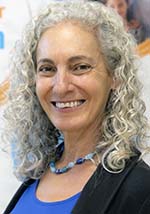By Rabbi Susan Freeman

SAN DIEGO — Life is busy. Too often we exchange a hurried platitude, like “Hi, how are you?” in passing to the people we encounter in our daily lives without even waiting for an answer – missing an opportunity for true connection and exacerbating the feelings of loneliness that can permeate our lives even though we are all “connected.”
Think back to a moment where you felt truly seen and understood in a conversation – smiles or hugs were exchanged, and you walked away with a stronger connection to the other person. Simple acts of impactful listening – what I call “compassionate listening” – can build more vibrant communities and invite people who are lonely into fulfilling experiences for deeper connections.
Thoughtful questions such as “How are you doing this morning?” “How are you feeling inside?” and “How are your spirits?” are great starts toward a deeper conversation. Throughout a conversation, a compassionate listener should make an effort to look at the world through the speakers’ eyes and understand their story’s impact on the speaker.
Compassionate listening is also a physical exercise. According to foundational research from UCLA, nonverbal communication accounts for at least 70% of our conversations. That is why, from a conversation’s beginning, a compassionate listener is encouraged to achieve and sustain eye contact (if culturally appropriate) and turn toward the speaker to convey a readiness to listen.
In a conversation, compassionate listeners often mirror the speaker’s emotions. A shared smile or nod of understanding can create a bond. Just as anxiety can spread, so can peace and comfort.
Compassionate listening is especially needed now, given the spike in loneliness and isolation. According to alarming research from U.S. Surgeon General Dr. Vivek Murthy, approximately half of U.S. adults report experiencing loneliness. For some people, it’s as harmful as smoking 15 cigarettes a day, based on research by the World Health Organization in the Commission on Social Connection.
Together, we can lessen the blow. Health professionals can include loneliness in their depression screenings and pair them with recommendations. Surely, when community leaders include addressing loneliness as a priority, many other creative ideas will emerge.
As part of the Center of Jewish Care’s leadership team and a board-certified chaplain, I practice compassionate listening when comforting clients, supporting staff members, or connecting with community members who may be struggling. While my spiritual care background is in healthcare, I believe we can extend the empathy typically associated with visiting the sick to a much broader population. Hearing and responding to what others say is a natural part of daily interactions, but effective and compassionate listening requires skills, practice and the confidence to reach out to those experiencing loneliness. While loneliness can be a cause for distress at any stage of life, seniors often are identified as an especially vulnerable population.
Jewish Family Service offers a companion program called “Friendly Match” to connect volunteers – everyday San Diegans who are looking to practice compassionate listening and give back – with local seniors experiencing loneliness of all faiths and backgrounds.
Participants are trained to build life-enriching relationships with those in their communities. Building on Jewish virtues and values, volunteers are taught to deepen their capacity for compassion, self-awareness and insight. Volunteer training includes listening skills, ethical decision-making, grief, self-care, confidentiality and storytelling.
Through their participation, volunteers learn how addressing grief and being present with those facing cognitive and physical challenges can make a difference in the lives of others – they too can experience an expansion of their own heart and spirit. For both older adult and volunteer, this relationship springs more hope – something we could all use a little more of.
Friendly Match program volunteers begin with a series of training courses, both in-person and via Zoom. The next series begins Sunday, October 27. Interested in becoming a volunteer? Fill out the form here. To learn about Jewish Family Service and all the volunteer opportunities offered, visit www.jfssd.org/volunteer.
*
Rabbi Susan Freeman works at Jewish Family Service’s Center for Jewish Care, which is dedicated to assisting and addressing the needs of San Diego’s Jewish community.